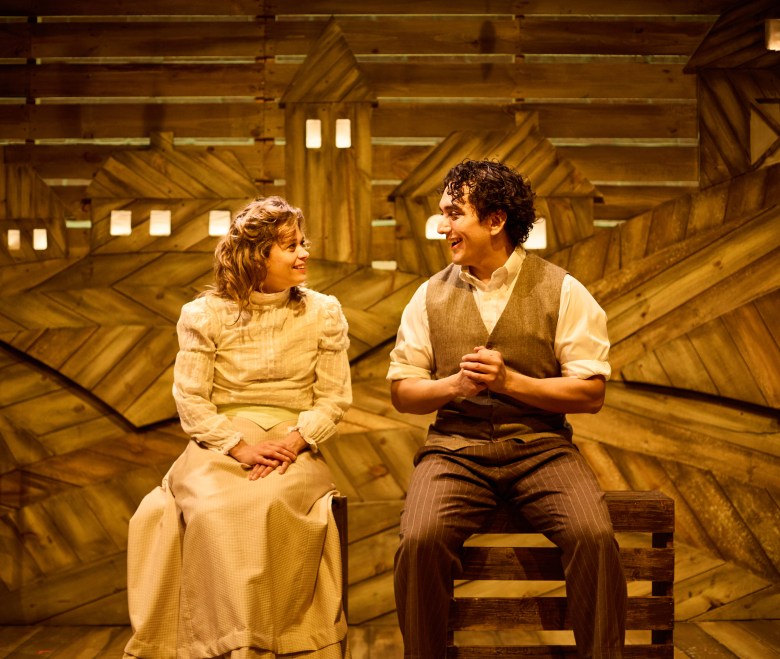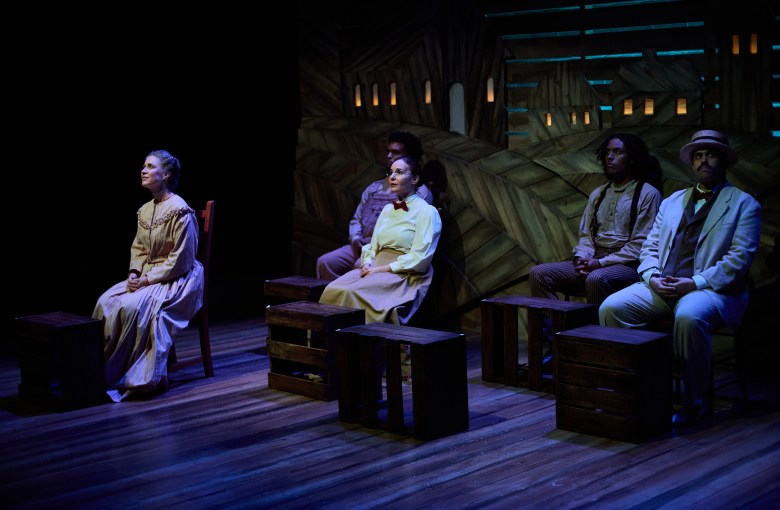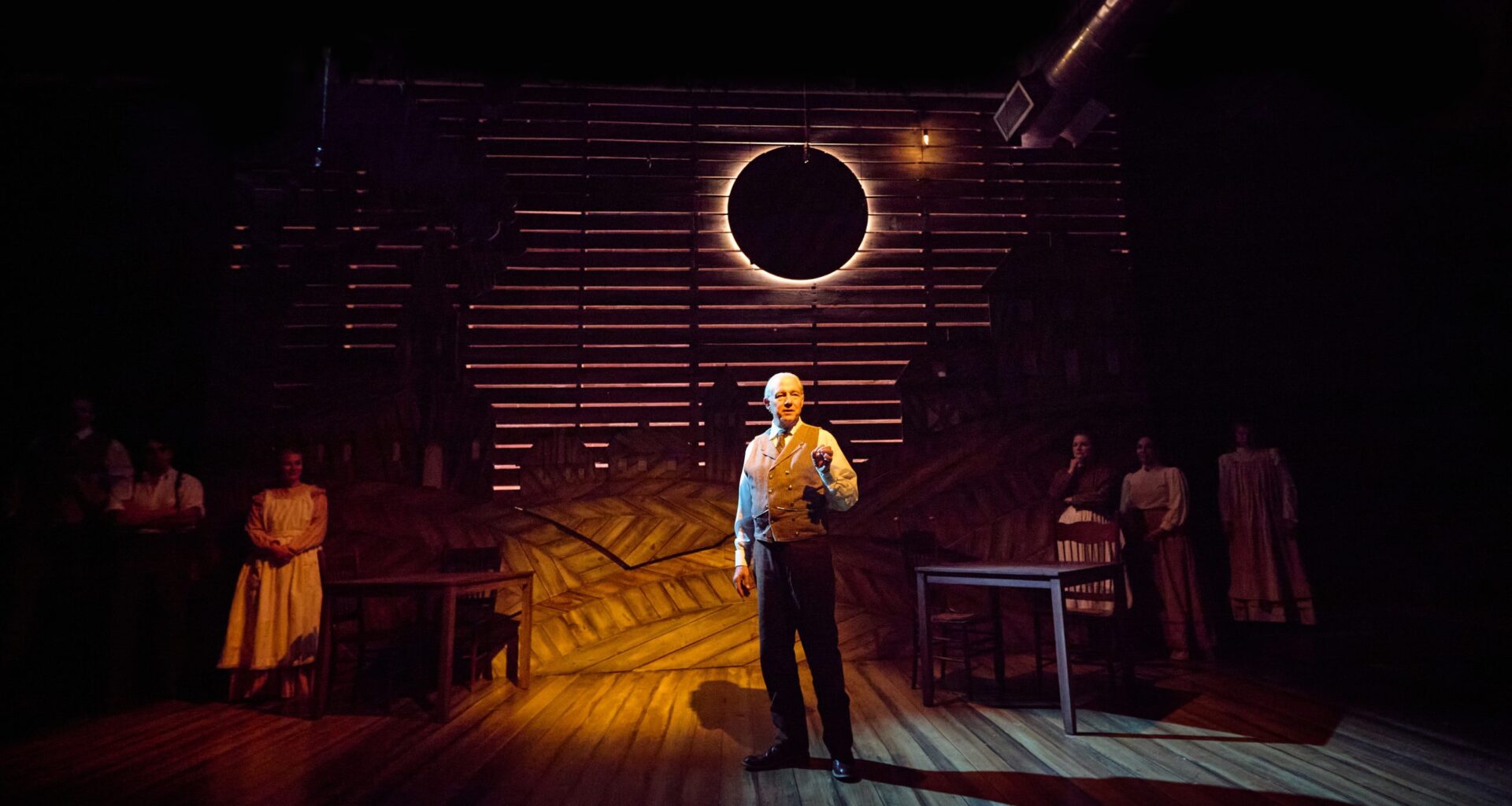“So – people a thousand years from now – this is the way we were…” says the Stage Manager in Thornton Wilder’s Our Town as he imagines including the story of the people of Grover’s Corners, New Hampshire, in a time capsule.
It hasn’t been a thousand years, not since Wilder wrote the play nor since its early 20th-century setting, but we can still open that time capsule and visit that small New England town, as the play is now running at 4th Wall Theatre Company.
The play takes us to Grover’s Corners across three acts. In the first act, we meet two families, the Webb and Gibbs families, and get a sense of the rhythms of daily life in this small town in 1901. The second tells the story of Emily Webb and George Gibbs, detailing the moment they fell in love and their wedding three years later. In the final act, set in 1913, we visit the cemetery in Grover’s Corners.
That’s “Daily Life,” “Love and Marriage,” and finally “Death and Eternity.”
Our Town premiered in 1938, and it is not only a Pulitzer Prize-winning play, but a highly regarded work widely considered to be one of the best American plays ever written (if not the best). It was revolutionary and challenging to audiences in its form and staging, presenting a deceptively simple portrait of small-town America that reveals a profound mediation on themes of mortality and impermanence. Its first two acts build up to a devastatingly emotional third act, which, when it lands, can be one of the most affecting experiences in theater.
Director Jennifer Dean approaches Our Town with a gentle hand, favoring an interpretation that leans more toward sentimental Americana than Wilder’s stark, existential minimalism – something especially apparent in the production’s visual language.
 OUR TOWN_2 – Skyler Sinclair and Elijah Eliakim Hernandez in 4th Wall Theatre Co.’s production of Our Town. Credit: Gabriella Nissen
OUR TOWN_2 – Skyler Sinclair and Elijah Eliakim Hernandez in 4th Wall Theatre Co.’s production of Our Town. Credit: Gabriella Nissen
The scenery, for those who think they need it, is a woodsy backdrop by Kirk A. Domer that gives the impression of a carved, handcrafted miniature town, with cut-out houses and glowing windows set within geometrically arranged planks. It lends the production a rustic, storybook-like quality that is reinforced by Rosa Cano’s overwhelmingly warm lighting designs.
Cano gives Grover’s Corners a sepia-amber glow, a choice that evokes a nostalgic aesthetic. Cano also makes good use of the slats in Domer’s set to let light spill through the beams, adding a dimensionality and weight to it, and makes striking use of a circular disk that becomes, in turn, the glowing sun and moon. When Act III opens, Cano shifts to cooler blue tones and shadows. It’s an effective contrast, though one that remains consistent with the production’s overall visual softness.
Yezminne Zepeda’s sound design is intentionally minimal. Dialogue is crisp, and the ensemble supplies a bit of the ambient soundscape, doing their best impressions of chickens, train whistles, and birds. This choice enhances the handcrafted, communal quality of the staging, and these touches earned charmed smiles and light chuckles from the audience, underscoring the homespun tone. Schmidt’s costumes, period-specific, with turn-of-the-century staples like high collars, straw hats, vests and coats for men, etc., add to the sense of nostalgia, too.
Together, these design choices create a production that is undeniably lovely to look at, pretty and rich with crafted detail. At times, though, they feel at odds with Wilder’s emphasis on sparseness and open space. The stage remains bare with only tables, chairs, ladders, and crates present throughout the first two acts, but the abstraction slips in Act III. When Emily revisits her twelfth birthday, the introduction of literal props (including milk bottles, birthday packages, and toy food) breaks the previously established visual vocabulary. While understandable, this sudden materiality proves to be distracting in an act that already feels rushed, pulling focus from Emily’s emotional realization.
The overall effect is a production that feels safe, its sharpest edges sanded down. The warmth, charm, and aesthetic coherence are there, but they dull the play’s existential teeth. As a result, Act III’s heartbreak lands with less force than expected, its customary gut punch missing. It’s worth noting that within this invitingly drawn world, the actors are left to navigate Wilder’s shifts in tone, starting with Philip Lehl’s Stage Manager.
 Christy Watkins, Algy Alfred, Patricia Duran, Joshua Percy, and Christian Tannous in 4th Wall Theatre Co.’s production of Our Town. Credit: Gabriella Nissen
Christy Watkins, Algy Alfred, Patricia Duran, Joshua Percy, and Christian Tannous in 4th Wall Theatre Co.’s production of Our Town. Credit: Gabriella Nissen
Lehl is excellent as the Stage Manager. From an omniscient perch, Lehl tours the audience around Grover’s Corners, down family trees, and through personal histories and eventual futures, with ease. His presence is kind and steady, deceptively hiding how deft Lehl is at controlling the audience’s attention. At times, his hand lands lightly on an actor’s back, giving them a subtle nudge toward their place, and it’s a gesture that mirrors the way he shepherds the audience through the story. Calm, wry, and subtly authoritative, Lehl beautifully sets and maintains the production’s tone.
Through the first two acts, Skyler Sinclair is a luminous Emily Webb. Sinclair is tender with Emily, capturing the brightness the script tells us all about. But in Act III, the scene rushes forward with little space for emotional breath, meaning we don’t get to feel the enormity of Emily’s realization.
As George Gibbs, Elijah Eliakim Hernandez brings an earnest, slightly immature charm that is well-matched with Sinclair. He is the son of Kregg Dailey’s Dr. Gibbs, who comes across like a fair, mid-century sitcom father, and Christy Watkins’ Mrs. Gibbs, who blends tiredness with a quiet, wistful longing. Faith Fossett’s Mrs. Webb is likewise overworked, warm, and brisk. She is a woman who expresses affection through her household activities rather than softness. Philip Hays gives Mr. Webb a playful dynamic with his daughter and plays the awkward early moments with George the morning of the wedding delightfully.
Several supporting players add memorable texture to Grover’s Corners. Patricia Duran draws attention in all the right ways as Mrs. Soames, the town’s wide-eyed wedding lover, and Christian Tannous tackles three distinct roles: the pedantic, giggle-prone Professor Willard; the friendly milkman Howie Newsome; and the bitter Simon Stimson. As the youngest Webb and Gibbs siblings, Joshua Percy adds a boyish energy as both Wally Webb and the paperboys, and Ellis Holden is sweet and curious as Rebecca Gibbs, grounding her scenes with unaffected charm. Algy Alfred rounds out the cast as a brusque questioner of Mr. Webb and Mr. Carter, who quietly reminisces about his son’s knowledge of the stars in the third act.
So, that’s the way they were, in their growing up, and in their marrying, and in their living, and in their dying. Though this handsome production is full of warmth and crafted beauty, and imbued with tenderness, it doesn’t always let us feel the full weight of that cycle.
Performances will continue at 7:30 p.m. Thursdays through Saturdays and 2:30 p.m. Sundays through December 20 at Spring Street Studios, 1824 Spring. For more information, call 832-767-4991 or visit 4thwalltheatreco.com. $40-$70. Ticket discounts are available for those under 25 and seniors 65 and older.
This article appears in Jan 1 – Dec 31, 2025.
Related
